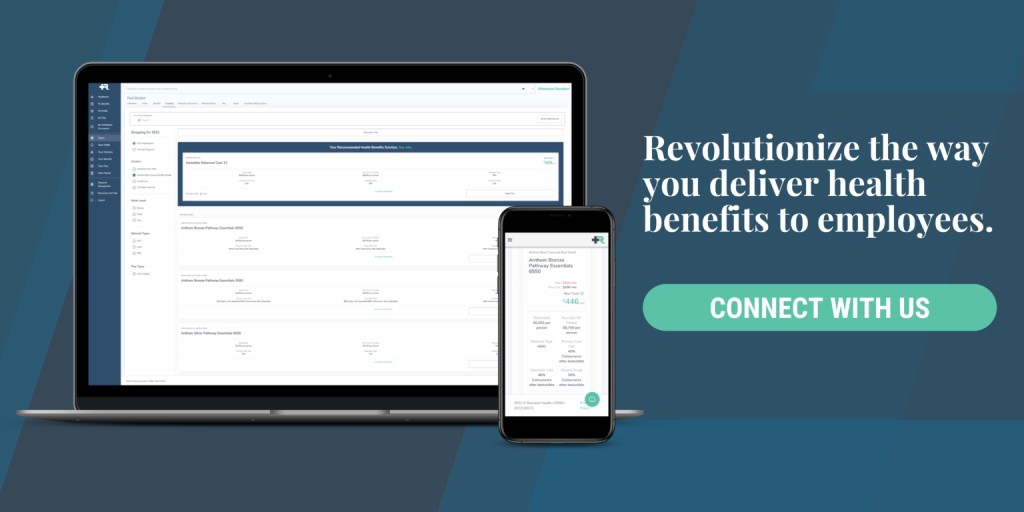
The gig economy is transforming the way people work, offering flexibility and independence to millions. But with this shift comes unique challenges, particularly in accessing reliable health benefits. For many gig workers, finding affordable and tailored healthcare options remains a critical concern.
How can ICHRAs address these needs?
ICHRAs provide a fresh approach to health benefits, offering workers the opportunity to customize their coverage while giving employers a cost-effective way to support their teams. The ICHRA impact on workers is profound—helping them manage health care expenses, maintain stability, and focus on their careers with confidence.
In this blog, we’ll explore how ICHRAs align with the needs of gig workers, why they’re a smart solution for independent professionals, and how they shape the future of benefits in the evolving workforce. Let’s dive in!
Understanding ICHRAs
Individual Coverage Health Reimbursement Arrangements (ICHRAs) are a modern approach to employer-sponsored health benefits. Instead of providing a one-size-fits-all insurance plan, employers reimburse employees for individual health insurance costs and other qualified medical expenses. This flexibility allows workers to choose health plans tailored to their unique needs.
Key components of ICHRAs include defined reimbursement limits, tax-free contributions for employers and employees, and compatibility with individual health plans. Employers decide how much to reimburse, ensuring predictable healthcare spending. For gig workers, who often lack stable employer-sponsored benefits, this setup can be a game-changer.
How does ICHRA compare to traditional group health insurance? Traditional plans require employers to manage a single plan for all employees, which can lead to administrative burdens and limited flexibility. With ICHRA, the responsibility shifts. Employees choose their plans, freeing employers from complex administration while empowering workers with autonomy.
For salaried employees or gig workers, ICHRAs offer a more inclusive and adaptable solution. It’s about meeting diverse needs while controlling costs effectively.
READ MORE | 3 ICHRA Reimbursement Strategies You Should Know
The Rise of the Gig Economy
The gig economy refers to a labor market characterized by short-term contracts, freelance work, and independent contracting. From graphic designers and rideshare drivers to delivery workers and consultants, gig roles span a wide range of industries. Temporary employees and platform-based workers, such as those on food delivery apps, exemplify this growing segment of the workforce.

In recent years, the gig economy has seen significant growth. Studies show that 61% of gig workers now rely on gig work as their primary income source. This shift is fueled by technological advancements and a preference for flexible job opportunities. However, this flexibility often comes at a cost—gig workers typically lack employer-sponsored benefits like health insurance coverage.
These workers face unique challenges, such as unpredictable income and rising healthcare costs. For low-wage workers in particular, accessing affordable and comprehensive health insurance options remains a top concern. Flexible benefits, like ICHRAs, can bridge this gap by empowering gig workers with personalized health insurance options that align with their dynamic lifestyles.
The Importance of Health Benefits in the Gig Economy
Health insurance is a critical concern for freelancers and gig workers. Without the stability of traditional employment, these workers must navigate healthcare on their own, often without the safety net of employer-sponsored group health plans.
For gig workers, affordable coverage isn’t just a luxury—it’s essential to maintaining financial and personal well-being.
Barriers to Health Insurance for Gig Workers
- Cost Concerns: Premiums can be prohibitively expensive for workers without employer contributions.
- Eligibility Issues: Many gig workers don’t qualify for premium tax credits or subsidies, especially if income fluctuates.
- Complex Systems: Navigating individual health plans can feel overwhelming without guidance or support.
- Lack of Access: Some regions have limited options for affordable or comprehensive health coverage.
The absence of health benefits can take a toll on gig workers. Uninsured workers often face steep medical bills, leading to financial strain and even debt. Personal well-being also suffers, as many avoid preventive care or delay necessary treatments.
Solutions like ICHRAs offer defined contribution models, helping eligible employees and gig workers access affordable, flexible insurance plans. This ensures better health outcomes while providing a financial buffer against unexpected healthcare costs.
How ICHRAs Fit into the Gig Economy
ICHRAs are a game-changer for independent contractors, offering flexibility and customization that traditional benefits rarely provide. For gig workers juggling diverse roles, an ICHRA plan lets them take control of their health care coverage by reimbursing eligible medical care expenses and premium payments for individual market plans.
Unlike a traditional group plan that ties workers to a specific employer’s insurance offering, ICHRA coverage empowers gig workers to choose a plan that fits their needs and lifestyle. Whether they prioritize low individual market premiums or comprehensive health care, ICHRA keeps the decision in their hands. This freedom is vital for contractors whose work may span multiple employers or platforms.
For businesses, offering ICHRAs to gig workers provides a simple way to address healthcare costs without the complexity of traditional group coverage. By defining reimbursement limits, companies can predict expenses while supporting workers with affordable options.
Key Components of ICHRAs Relevant to Gig Workers
Accessing an ICHRA as a gig worker starts with meeting eligibility requirements. Gig workers must enroll in an individual health insurance plan that complies with minimum essential coverage standards. This ensures that freelancers, contractors, and temporary employees receive meaningful support while addressing their unique coverage needs.
Reimbursable expenses under an ICHRA extend beyond just health insurance premiums. Qualified expenses can include deductibles, co-pays, and certain medical supplies. For instance, an independent delivery driver might use ICHRA funds to cover prescription glasses or specialist fees, ensuring their healthcare needs don’t interrupt their workflow or financial stability.
Another critical factor for gig workers is understanding how contribution limits work. Employers set these limits, providing flexibility to determine the level of support offered. This approach allows gig workers to predict the assistance available for their health care costs, bypassing the constraints often found in traditional group health plans. Tailored reimbursements like these simplify health benefit management and align with the dynamic nature of gig work.
Learn more about how Remodel Health’s ICHRA+® can benefit your organization
Benefits of ICHRAs for Gig Economy Workers
ICHRAs bring tailored solutions to the gig economy, addressing unique healthcare needs with flexibility and control. Let’s explore the key advantages.
Tax Benefits for Everyone
ICHRAs offer tax-free reimbursements for both employers and workers. Employers save on payroll taxes, while gig workers enjoy untaxed funds for eligible healthcare expenses. These tax advantages make ICHRAs a financially smart alternative to traditional group health plans.
Lower Costs for Freelancers
With ICHRAs, freelancers can save significantly by leveraging defined contributions to offset individual healthcare expenses. For instance, using premium tax credits alongside ICHRA funds can reduce out-of-pocket health insurance costs. This dual savings approach is a game-changer for independent workers.

Tailored Health Coverage Options
ICHRAs allow workers to select health insurance plans that fit their specific needs, unlike one-size-fits-all employer-sponsored coverage. Gig workers can prioritize essential services, whether it’s dental care, mental health support, or preventive services.
Empowerment Through Autonomy
ICHRAs provide gig workers with control over their healthcare choices. By removing reliance on employer-dictated plans, workers can select individual plans that align with their personal and professional priorities. This autonomy fosters confidence and satisfaction.
Financial Implications of ICHRAs for Gig Workers
ICHRAs offer freelancers a unique cost-benefit balance in managing healthcare expenses. By allowing gig workers to leverage employer contributions toward individual insurance plans, ICHRAs present an effective alternative to navigating rising healthcare costs without the rigidity of a group health plan. This structure empowers workers to maintain financial control while addressing healthcare needs.
One key advantage of ICHRAs is their ability to reduce taxable income. Reimbursements for health insurance premiums and eligible medical expenses are tax-free, helping gig workers retain more of their hard-earned money.
Beyond immediate savings, ICHRAs contribute to long-term financial stability. With predictable contributions toward healthcare expenses, gig workers can plan ahead and avoid unexpected financial strain. The ability to manage health costs proactively gives gig workers peace of mind, enabling them to focus on growing their careers while staying financially secure.
READ MORE | How to Offer ICHRA Alongside Other Health Benefits
Legal and Regulatory Considerations for ICHRAs in the Gig Economy
Navigating the legal requirements for ICHRA eligibility and usage is essential for gig workers and employers alike. To qualify for ICHRA benefits, workers must have individual health insurance plans that meet minimum essential coverage standards. Many employers offering ICHRAs must also ensure their plans are accessible to contractors, freelancers, and temporary workers, broadening the reach of these innovative health solutions.
How do state and federal regulations shape ICHRA offerings? Federal laws like the Affordable Care Act (ACA) establish guidelines for compliance, while some states impose additional requirements on individual health insurance plans. These overlapping rules can impact how gig platforms structure their ICHRA benefits, ensuring they align with both worker needs and legal obligations.
Compliance can be a challenge for both gig platforms and workers. For employers, balancing state-specific regulations with federal mandates requires careful planning. Workers, on the other hand, need clear guidance on plan eligibility and documentation requirements. To address these challenges, open communication and resources are critical to ensuring ICHRA plans are both accessible and compliant.
How Gig Workers Can Maximize the Benefits of ICHRAs
Selecting the right ICHRA-compatible health plan is a critical first step for gig workers. Start by comparing individual plans offered by health insurers to ensure they meet both your needs and ICHRA requirements. Look for plans that balance affordability with comprehensive coverage, particularly if you’re managing ongoing healthcare expenses.
How can you balance ICHRA reimbursements with out-of-pocket costs effectively?
- Choose plans with predictable premiums to maximize reimbursements.
- Keep an emergency fund for unexpected healthcare needs not covered by ICHRA.
- Monitor reimbursement limits to ensure your out-of-pocket spending stays within budget.
Financial planning is just as important for optimizing your ICHRA benefits. Track your healthcare expenses regularly and align them with your ICHRA reimbursements. Use online tools or apps to streamline this process and avoid overspending.
Consider consulting a financial advisor for tips on integrating your ICHRA benefits into a broader budget strategy. By staying proactive and informed, you can make the most of your ICHRA while maintaining financial stability.
Maximizing ICHRAs for Gig and Remote Workers
ICHRAs are transforming how gig economy and remote workers access health benefits. By combining flexibility with financial advantages, ICHRAs cater to diverse needs, from younger workers just starting out to seasoned freelancers juggling multiple clients.
The ability to pair ICHRAs with a premium tax credit enhances affordability, ensuring coverage options fit various budgets. This adaptability empowers workers to focus on their careers without compromising on essential healthcare.
For employers, offering ICHRAs is a smart way to attract and retain top talent in a competitive market. Providing tailored benefits not only reduces turnover but also fosters loyalty among workers who value autonomy and personalized support.
Are you ready to embrace ICHRAs as a modern solution for gig workers?
Remodel Health provides expert support and customized solutions to simplify ICHRA implementation. Together, we can design a benefits plan that meets your unique needs and supports your workforce effectively.
Contact us today to get started!

